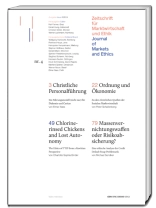Gerade Unternehmen in christlicher Trägerschaft stehen vor der Herausforderung, wie sie ihr Profil gegenüber Mitbewerbern etwa im Gesundheits- und Sozialmarkt oder im Bildungswesen behaupten können. Wesentlich zählt dazu auch die Umsetzung einer Führungskultur, die dem christlichen Selbstverständnis entspricht. Bausteine für eine solche kohärente Führungstheorie werden hier deduktiv vorgestellt.
Mục lục
I. Christlicher Auftrag
II. Systematik für eine Ethik der Personalführung
III. Monologische Führungsethik
IV. Dialogische Führungsethik
V. Von einer Kantischen zu einer christlichen Führungsethik
VI. Ertrag und Ausblick
Anhang
Literatur
I. Das christliche Menschenbild und der Sozialstaat
II. Gerechtigkeit in biblischer und philosophischsoziologischer Perspektive
III. Soziale Gerechtigkeit als Beteiligungsgerechtigkeit: Solidarität und Subsidiarität als Prinzipien
IV. Ökumenische Impulse zur Genese der Sozialen Marktwirtschaft
V. Verhältnis von Freiheit und Ordnung im Sozialstaat einer Sozialen Marktwirtschaft in Europa
Literatur
I. Introduction
II. The Transatlantic Trade and Investment Partnership
1. The Benefits of Free Trade in Theory
2. The Common Protectionist Measures and Their Effects
3. The Features of the TTIP
4. Expected Consequences of the TTIP
a. Participating Countries
b. Third Countries and the Global Economy
III. Rawls’s Theory of Justice 1. Origin, Objectives and Features of Rawls’ Theory
2. The Universalization Principle
3. The Difference Principle
IV. Application of Rawls on TTIP
1. Analysis of the Effects on Justice and Inequality
a. The Chlorine-rinsed Chicken
b. Investor-state Dispute Settlement
2. Critical Evaluation of the Application of Rawls’ Theory
3. Ways of Making TTIP Morally Acceptable
V. Conclusion
Einleitung
I. Credit Default Swaps: Entstehung und Funktionsweise
Wie funktionieren CDS?
Der konkrete Fall ‚Griechenland’
Warum CDS?
II. Nutzen- und Gefahrenpotenziale
Nutzen
III. Die sozialethische Dimension der CDS
1. Anreize zum Unterlassen von Kreditmonitoring
2. Anwendung von Insiderwissen
4. Prozyklische Spekulation mit CDS
5. Verantwortungsdiffusion der Finanzinstitute
6. Deregulierter CDS-Markt
7. Machtposition der Finanzinstitute gegenüber staatlichen Akteuren
Schluss
Literatur












